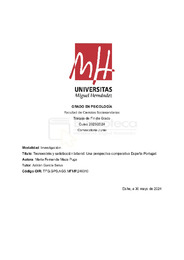Title:
Tecnoestrés y satisfacción laboral: Una perspectiva comparativa España-Portugal |
Authors:
Maza Puga, María Fernanda |
Tutor:
García Selva, Adrián |
Editor:
Universidad Miguel Hernández de Elche |
Department:
Departamentos de la UMH::Psicología de la Salud |
Issue Date:
2024-06 |
URI:
https://hdl.handle.net/11000/32599 |
Abstract:
Las tecnologías de información y comunicación (TIC) están muy presentes en las
organizaciones influyendo en la productividad y en la salud psicológica de los trabajadores.
La rápida evolución de la tecnología puede generar el llamado estrés tecnológico o
tecnoestrés. Este estudio investiga la relación entre tecnoestrés y satisfacción laboral
mediante una metodología cuantitativa. La muestra incluyó a 62 personas de nacionalidad
española y portuguesa que realizan trabajos mentales y utilizan frecuentemente TICs. Se
emplearon instrumentos como el Cuestionario de Tecnoestrés de Salanova et al. (2005) y su
versión portuguesa, junto con Overall Job Satisfaction de Global de Warr, Cook y Wall
(1979) en castellano y portugués. Los datos se recopilaron mediante una encuesta anónima
online a través de Google Forms. El análisis de los datos, realizado con Jamovi, incluyó
estadísticos descriptivos, consistencia interna, matriz de correlación de Pearson y análisis
ANOVA. Los resultados mostraron una relación significativa entre tecnoestrés y satisfacción
laboral. No se encontraron diferencias en esta relación al comparar por nacionalidad o
frecuencia de uso de TICs. Los hallazgos sugieren que el tecnoestrés afecta negativamente
la satisfacción laboral. Investigaciones futuras podrían enfocarse en estudios transculturales
que consideren diferentes contextos culturales para ampliar la comprensión de estas
dinámicas.
Nowadays, the information and communication technologies (ICT) has a high footprint in
organizations and it influences productivity and mental health of workers. The speed of the
changes and evolution of technology can generate technological stress or technostress. This
study investigates the relationship between technostress and job satisfaction through a
quantitative approach. The total sample was of 62 people whose nationality was Spanish
and Portuguese. As an inclusion criteria were considered people who work frequently with
TIC and have mental work. The Cuestionario de Tecnoestrés by Salanova et al. (2005) and
The Overall Job Satisfaction by Warr, Cook y Wall (1979) were used in their Spanish and
Portuguese version. The data collection was through an online and anonymous survey via
Google Forms. Data analysis were performed by Jamovi and were analyzed descriptive
statistics, Pearson correlation coefficient and ANOVA statistics. The results show that there
is a negative significant relationship between technostress and job satisfaction. However, no
significant relationships were found by nationality and the frequency’s use of TIC. It suggests that technostress negatively affects job satisfaction. Future research may focus on
transcultural studies which consider different cultural contexts in order to increase the
knowledge of these variables.
|
Keywords/Subjects:
tecnoestrés
satisfacción laboral
TIC
technostress
job satisfaction
ICT |
Knowledge area:
CDU: Filosofía y psicología: Psicología |
Type of document:
info:eu-repo/semantics/bachelorThesis |
Access rights:
info:eu-repo/semantics/openAccess |
Appears in Collections:
TFG - Psicología
|
.png)

